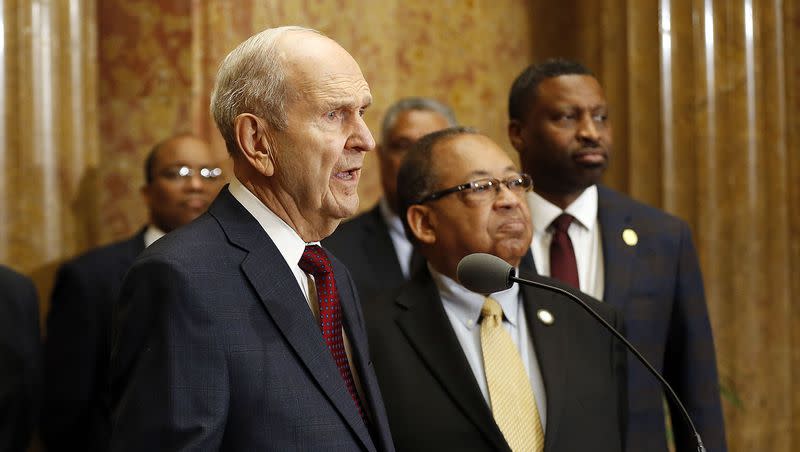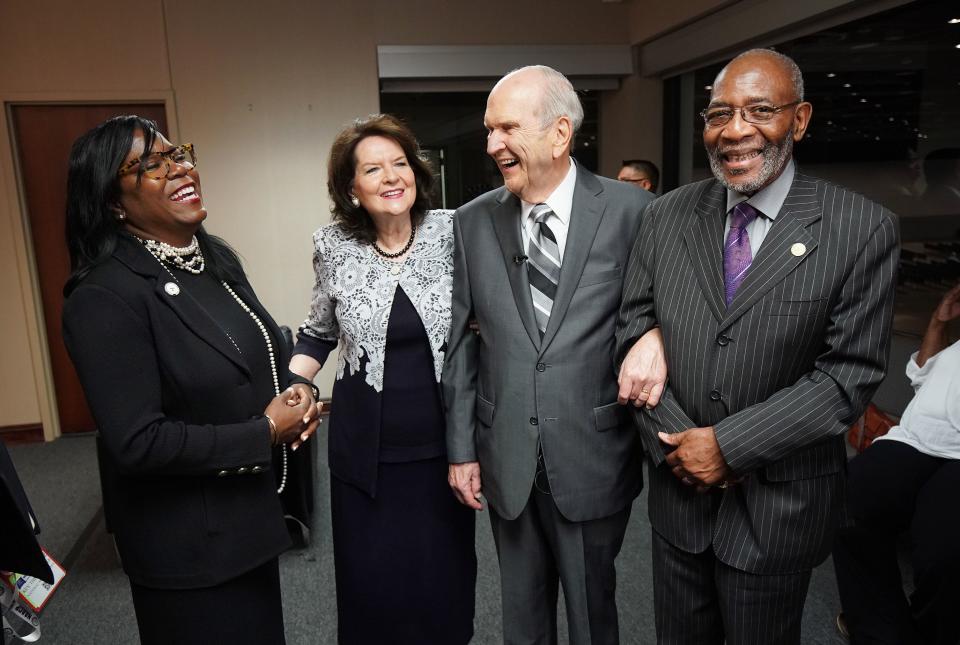President Russell M. Nelson will receive Gandhi-King-Mandela Peace Prize

After years of joining arms with Black leaders to call for greater racial and ethnic harmony, President Russell M. Nelson will receive the first Gandhi-King-Mandela Peace Prize next month from Morehouse College, a historically Black school in Atlanta.
The prize is awarded to “a person who promotes positive social transformation through nonviolent means. The individuals use their global leadership to affirm peace, justice, diversity and pluralism,” according to Morehouse.
“We wanted to identify Russell M. Nelson and link his name with these three giants,” said the Rev. Lawrence Carter, dean of the Martin Luther King Jr. International Chapel at Morehouse.
The King chapel board of directors made the selection, and the Rev. Carter said President Nelson has exhibited courage and unifying leadership.
“President Nelson is, I believe, a role model for how Christians need to get out of three boxes — the race box, the nationality box and the culture box — to unite the human family,” the Rev. Carter said. “With the power of his prophetic, revelational vision, he looked out across great troubles in this country and saw the chance to form an alliance,” he said of The Church of Jesus Christ of Latter-day Saints and the NAACP.
President Nelson has locked arms with NAACP leaders since a landmark news conference in May 2018, when they jointly called for an end to prejudice from a lobby at the headquarters of the church in Salt Lake City. The call came just months after the beginning of President Nelson’s administration as church president.
President Nelson also has implored church members directly to be examples of abandoning prejudice.
“I grieve that our Black brothers and sisters the world over are enduring the pains of racism and prejudice,” he said during an international general conference of the church in 2020. “Today, I call upon our members everywhere to lead out in abandoning attitudes and actions of prejudice. I plead with you to promote respect for all of God’s children.”
Related
That call has been echoed repeatedly by other senior church leaders.
Related
President Nelson will accept the Gandhi-King-Mandela Peace Prize by special broadcast during an event on April 13 at 7 p.m. at the King Chapel on the Morehouse campus in Atlanta.
An announcement by local church leaders in Georgia said the Tabernacle Choir at Temple Square will perform virtually for the event and some Latter-day Saint general authorities will attend in person.
Oil portraits of President Nelson and Abraham Lincoln will be added to the Hall of Honor in the chapel.
The Gandhi-King-Mandela prize was created this year “to address the national fracture and create more incentive and motivation to talk about peace,” the Rev. Carter said.
He said he first became aware of The Church of Jesus Christ of Latter-day Saints as a fan of the Tabernacle Choir. Then he began a study of the church.
“I learned some things I did not know that powerfully impressed me,” he said. “I became convinced that most of the world is unaware of the first of these facts, which is that their founder, Joseph Smith, was also Abraham Lincoln before Abraham Lincoln. He ran for president of the United States on a political platform of compensation and emancipation.”
“It wasn’t until Lincoln that emancipation had a second chance,” the Rev. Carter said. “I’m grateful to Lincoln for the personal, social and religious freedom we enjoy today.”
Morehouse also will bestow a second honor at the April event. Ira Helfand, recipient of the 2017 Nobel Peace Prize, will receive the annual Gandhi-King-Ikeda Community Builder’s Prize.
Helfand is the co-president of the International Physicians for the Prevention of Nuclear War and will speak at the event about nuclear abolition, the Rev. Carter said.
Fighting racism
President Nelson has consistently addressed racism during his presidency.
He spoke at the 2019 NAACP national convention in Detroit and said, “I pray that we may increasingly call each other dear friends.”
“Arm in arm and shoulder to shoulder, may we strive to lift our brothers and sisters everywhere, in every way we can. This world will never be the same,” he said.
The Rev. Carter said he has read President Nelson’s speech in Detroit several times.
“I was powerfully moved at the expression and the willingness of President Nelson to form a partnership with the strength of the church joined with the strengths of the NAACP to do good for a larger number of people across racial lines,” the Rev. Carter said.
The church and the NAACP have worked together since 2018 to create a customized self-reliance program for inner-city Black populations.
In 2020, President Nelson and NAACP leaders wrote a joint letter that decried the death of George Floyd, a Black man murdered by police in Minnesota.
The letter also called for people to work together to end systemic racism.
Related
“We likewise call on government, business and educational leaders at every level to review processes, laws and organizational attitudes regarding racism and root them out once and for all,” said the letter, which was signed by President Nelson, NAACP President Derrick Johnson, NAACP Chairman Leon Russell and the Rev. Amos C. Brown.
Brown was one of eight students in a Morehouse College class taught by King in the 1960s. Brown graduated from Morehouse in 1964 and is a supporter of the college and the King chapel, the Rev. Carter said.
President Nelson also directed a $9.25 million church donation to the NAACP and UNCF (United Negro College Fund) in 2021 for scholarships and inner-city humanitarian aid.
President Nelson honored Brown last year as part of the donation to the NAACP. A $250,000 grant allowed 43 students to visit Ghana to explore their African roots as Amos C. Brown Fellows.

Latter-day Saint colleges and universities have reviewed their policies and surveyed students in response to the call to end racism in schools. President Nelson is the chair of the board of trustees at Brigham Young University and four other colleges and universities.
An official BYU committee published a report that found individual and systemic racism at the Provo, Utah, school and issued 26 recommendations. The university has begun to implement many of the recommendations, including the formation of an Office of Belonging.
Related
Since then, Black leaders like Martin Luther King III and the Rev. William Barber II have spoken at BYU campus forum assemblies.
Related
At BYU, Martin Luther King III echoes Latter-day Saint themes of charity, service and God’s family
BYU students stood and cheered as this prominent pastor called for a ‘moral march on Washington’
The Gandhi-King-Ikeda Institute for Cosmopolitan Virtue-Ethics and Reconciliation, founded by the Rev. Carter, founding dean of the King chapel, has awarded the Gandhi-King-Ikeda Community Builder’s Prize annually since 2001. Recipients include Nelson Mandela, Mikhail Gorbachev, Archbishop Desmond Tutu and Coretta Scott King.
The Rev. Carter and the Martin Luther King Jr. board members selected President Nelson for the Gandhi-King-Mandela Peace Prize.
Related
How the NAACP and Latter-day Saints are working together in inner cities
President Nelson to national NAACP convention: We want to be ‘dear friends’
The Martin Luther King Jr. International Chapel is “the world’s most prominent religious memorial to Morehouse alumnus Rev. Dr. Martin Luther King, Jr.,” according to its website.
The chapel’s Hall of Honor displays oil paintings of world leaders who have exemplified nonviolent diplomatic philosophies.

